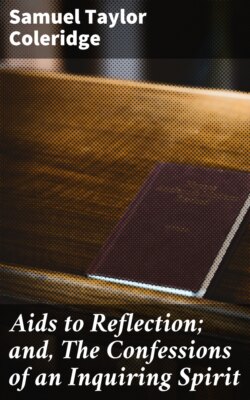Читать книгу Aids to Reflection; and, The Confessions of an Inquiring Spirit - Samuel Taylor Coleridge - Страница 50
На сайте Литреса книга снята с продажи.
APHORISM XXXI.
ОглавлениеLast and highest, come the spiritual, comprising all the truths, acts, and duties that have an especial reference to the Timeless, the Permanent, the Eternal: to the sincere love of the True, as truth; of the Good, as good: and of God as both in one. It comprehends the whole ascent from uprightness (morality, virtue, inward rectitude) to godlikeness, with all the acts, exercises, and disciplines of mind, will, and affection, that are requisite or conducive to the great design of our Redemption from the form of the evil one, and of our second creation or birth in the divine image.[34]
[34] It is worthy of observation, and may furnish a fruitful subject for future reflection, how nearly this scriptural division coincides with the Platonic, which, commencing with the prudential, or the habit of act and purpose proceeding from enlightened self-interest, [qui animi imperio, corporis servitio, rerum auxilio, in proprium sui commodum et sibi providus utitur, hunc esse prudentem statuimus] ascends to the moral, that is, to the purifying and remedial virtues; and seeks its summit in the imitation of the Divine nature. In this last division, answering to that which we have called the Spiritual, Plato includes all those inward acts and aspirations, waitings, and watchings, which have a growth in godlikeness for their immediate purpose, and the union of the human soul with the Supreme Good as their ultimate object. Nor was it altogether without grounds that several of the Fathers ventured to believe that Plato had some dim conception of the necessity of a Divine Mediator, whether through some indistinct echo of the patriarchal faith, or some rays of light refracted from the Hebrew prophets through a Phoenician medium, (to which he may possibly have referred in his phrase, θεοπαραδοτος σοφια, the wisdom delivered from God), or by his own sense of the mysterious contradiction in human nature between the will and the reason, the natural appetences and the not less innate law of conscience (Romans ii. 14 15.), we shall in vain attempt to determine. It is not impossible that all three may have co-operated in partially unveiling these awful truths to this plank from the wreck of paradise thrown on the shores of idolatrous Greece, to this Divine Philosopher,
Che 'n quella schiera andó più presso al segno Al qual aggiunge, a chi dal cielo è dato.
Petrarch: Del Trionfo della Fama, Cap. III. 5 6.
